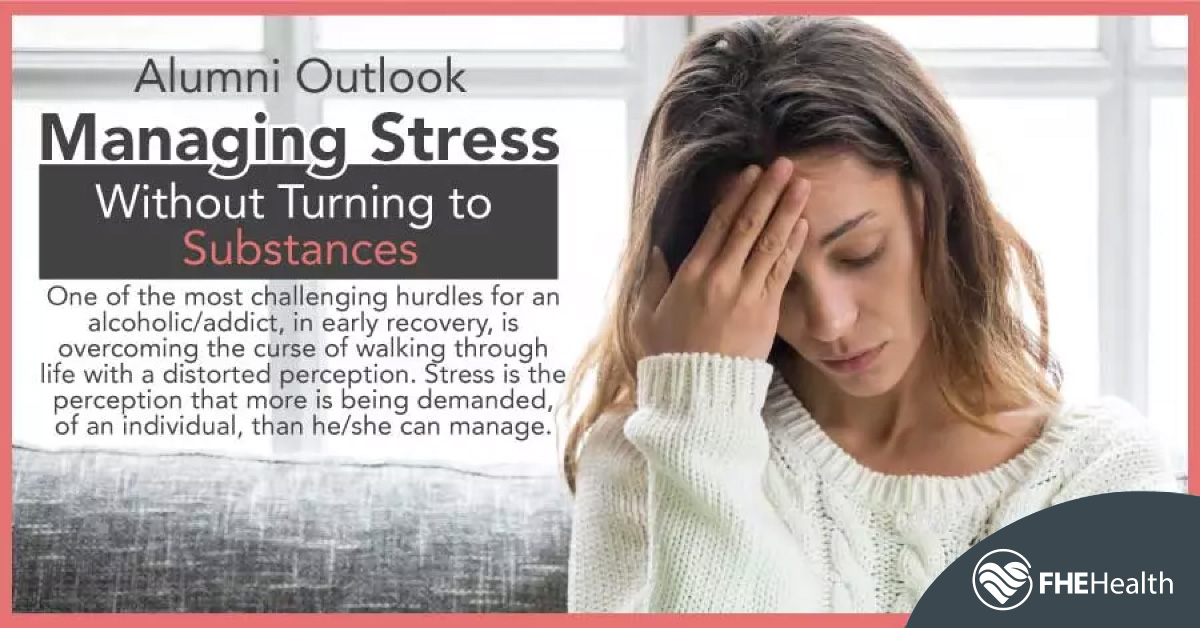
One of the most challenging hurdles for an addict is learning how to deal with stress without alcohol. In fact, studies have shown that 50% of people relapse within the first 12 weeks after leaving treatment. A fight with their partner, a stressful day at work or a bad encounter with a stranger could send a person spiraling.
Why Are Healthy Coping Skills Important?
Learning about coping without alcohol is essential because people are more likely to reach for substances when they’re stressed. Sometimes it’s easy to think, “Why can’t I have one drink? I just want something to take the edge off.” However, one drink, pill or injection may quickly lead to a full relapse. Healthy coping skills make it possible to deal with challenges while remaining sober.
How to Deal With Stress Without Alcohol
Step Back
When you spiral into obsessive thoughts, it’s easy to think your problems are insurmountable. Sometimes, stepping back is all you need to take an objective perspective. If you remove yourself from the situation, take a break and return once you’ve calmed down, that impossible challenge might have an easy solution.
If you can’t leave the situation, ask yourself, “Will this matter in a year? Will it even matter in a month or a week?” You could also think about challenges from 5 or 10 years ago and consider how insignificant they seem now.
Laugh at Yourself
Laughing provides instant stress relief. Many people find it easier to cope when they find something to laugh at about the situation. When nothing about the challenge seems humorous, you can give yourself a break by looking at online memes, watching a funny movie or listening to a comedy podcast. This also provides a break in the middle of the day so you can relax and recharge.
Practice Awareness and Acceptance
Before solving any problem, identifying the problem is critical. For many people, Step One is a relief. Once they’ve identified the problem, they can work on finding a solution.
Some people are avid list-makers. When they’re confronted with stress, they write down all the things causing them stress and what they can do to take action. If there’s nothing they can do to change the source of stress, they write down how they can cope with the pressure.
More often than not, acceptance is the solution. Accepting that some things are entirely out of your control cultivates inner peace. In recovery, you may conclude that you can’t control anything other than yourself. You don’t have to have all the answers, but you can learn to practice acceptance and take action toward eliminating stress.
Meditate
For some, meditation is a go-to coping skill. Whenever they’re struggling with feelings of stress, fear and practicing acceptance, they take time to meditate. Studies have shown that meditation is beneficial to overall quality of life, both physically and mentally.
It’s so easy to get caught up in the painful memories of the past and obsess over the anxieties of the future. The solution seems so simple, yet unhealthy habits and thought patterns say otherwise. Mindfulness meditation has been an ever-evolving tool that some people utilize when they find themselves drowning in seemingly unwarranted stressful emotions.
Meditation requires individuals to surrender and accept what was, what is and what’s to come. The goal of mindfulness is enlightenment, which refers to awareness, attention and remembering. The individual should become aware of what goal/object they wish to achieve, focus on that idea and ultimately remember and manifest the concept. Mindfulness can reduce feelings of anxiety and depression, control the body’s reaction to stressors, aid in pain management and help people process their emotions. Recovery requires awareness, balance and control, which can be cultivated through many meditative practices.
Ask For Help
Almost all recovering people struggle with the idea of asking for help. However, you have to let go of the belief that you can do everything alone. Those who successfully navigate through stress typically have a strong support system. In fact, one of the fundamental roots of recovery is fellowship.
Isolation can be disastrous for anyone struggling with addiction. It’s so easy to get caught up in stress, and not talking about it can be fatal. Therapy can be liberating. It’s always better to speak to someone who understands exactly what you’re going through. For some people, it’s hard to confess that they’ve been struggling, but speaking out loud helps to sort out the chaos in their heads.
Move Your Feet
It’s not uncommon to feel overwhelmed by stress and cravings and become complacent in isolation. However, thoughts are fleeting. Instead, take action. Research shows an overwhelming amount of evidence that physical activity can dramatically relieve stress. Cleaning the house, going for a walk, or just putting on makeup can work wonders. Sometimes, “fake it till you make it” provides the desired outcome.
Be of Service
According to the Big Book of Alcoholics Anonymous, “Practical experience shows that nothing will so much ensure immunity from drinking as intensive work with other alcoholics. It works when other activities fail.” In other words: When all else fails, help another alcoholic. Selflessly helping others sometimes makes your own problems seem to disappear. There’s a magical change of perception that occurs when you lend a hand to help someone in need. It’s so easy for people to get unraveled within their own self-induced despair and stress. The goal is to get outside of yourself by humbly helping your fellows.
Start Your Recovery Journey
At FHE Health, you’ll learn how to deal with stress without alcohol. Our recovery programs offer treatment in a safe, nonjudgmental environment. Contact us today to speak with a representative.






